- Home
- Explore IBS
- Academic Excellence
IB School provides a nurturing and challenging learning environment for students, with a focus on fostering lifelong skills and preparing them for the opportunities of the future. The school's curriculum is carefully crafted to offer a well-rounded education that emphasizes IT Robotics and Artificial Intelligence, ensuring that students are equipped to thrive in the ever-evolving technological landscape.
Empowering Young Minds Through Play way Method:
Experts in the field of Early Years Learning Programme (EYLP) emphasise on the importance of play in early childhood education. It is not just a way for children to have fun but a powerful tool for learning and development. At IB Smart Start, we tap this energy through well-curated and structured activities which have proved to be highly effective in engaging young learners and fostering their holistic development.
Here, at IBSS, we follow the Early Years Learning Programme (ELYP) wherein we create opportunities for the young ones to learn through play, fun and exploration, something that happens naturally at this age. There is no resistance to learning when the little ones are actively engaged in meaningful, enjoyable and relevant experiences. These experiences help in developing not only their cognitive skills but also the gross and fine motor skills.
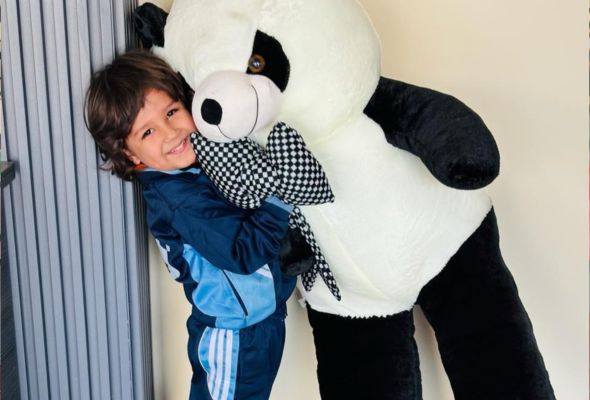
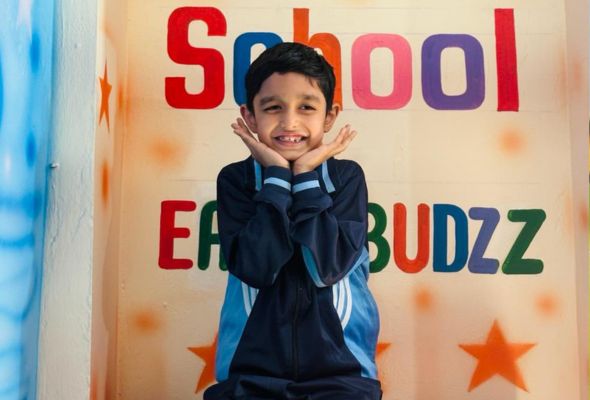
Key Principles of the Play way Method Integrated in IBSS:
Child-centric:
Placing the young learners at the centre of the learning process, activities and experiences are designed based on the child's interests, abilities, and developmental milestones.
Hands-On Learning:
Young learners at IBSS are engaged in play-based activities that encourage hands-on exploration, experimentation, and discovery, essential for developing cognitive, physical, and social skills.
Imaginative Play:
Role-play, pretend-play and other similar activities that tap the fertile imagination of the young learners, are the key components of the play way methods employed at IBSS. These activities further promote creativity, problem-solving, language development, and social interaction: essential skills needed to thrive today.
Contextual Learning:
Young learners are not loaded with abstract ways of teaching which kill the joy of learning; instead, all concepts and skills are taught in a context that is familiar, meaningful and relevant to them in their routine experiences. For example, counting and sorting is incorporated into games using fruits, vegetables and crayons or erasers.
The young learners are familiarised with numeracy skills through hands-on materials such as Sandpaper Numbers, the Bead Stair, the Binomial Cube, and others. Activities are gamified to keep them engrossed while they hone their problem-solving skills that shall form a strong base for more advanced numeracy skills.
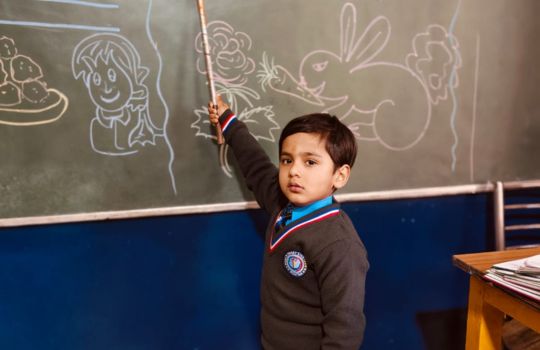
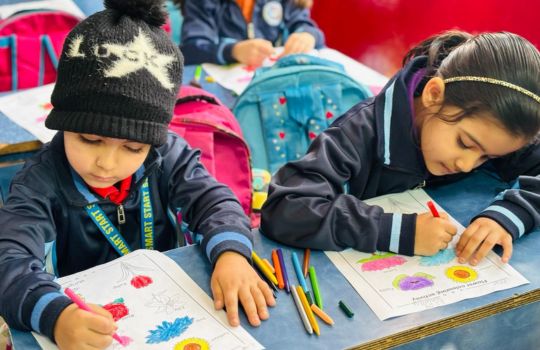
Inculcating Observation and Creativity through Art:
IBSS has set up art corners in each classroom with plenty of art material such as water colours, paints, crayons, colour pencils, marker pens, glue sticks, play dough, moulds, clay, sparklers and various types of paper. These are neatly organised, labelled and intentionally arranged at the eye level so that the young artists can easily access them and learn to become independent and responsible.
For the little IBSS learners, the tree is not always green or a mountain an inverted triangle; instead, they are encouraged to explore and create objects as they perceive them using different textures, techniques and media. Supervised nature rambles are regular features of the school calendar when the young learners observe their surroundings, people and nature. In order to stimulate critical thinking, self-expression and communication skills, they are asked open-ended questions.
Art Integration, one of the prime components of the NEP, is an inherent part of the activity plan at foundational stage. Young learners are encouraged to discover interdisciplinary connections by drawing or colouring compositions using geometric shapes, story illustrations, or cultural art traditions. At IBSS, the teachers focus on the process of creating art rather than the quality of the end product. We believe that the child’s effort, exploration, and self-expression are far more important than perfection.
Language and Communication:
We, at IBSS understand well that language is the basis of all social interactions and learning. Since, for Indian students, English is a Second Language (ESL), they need plenty of opportunities to immerse themselves in the phonic sounds of the language which are slightly different from their native language sounds. This is done through everyday interactions, classroom activities, and myriad similar resources.
The IBSS Language and Communication curriculum incorporates language games and activities such as songs, rhymes, show and tell, recitation, role-play, interactive conversations and storytelling in English to enable the young learners develop the requisite language skills, vocabulary, and early literacy concepts in an interactive and enjoyable manner.
Young learners at the foundational stage in IBSS are introduced to Jolly Phonics which is a synthetic phonic programme: child-centric, engaging and fun-filled. The Smart Start interactive boards are supported by the phonics-based software to ensure that the students get the desired atmosphere to learn the language.
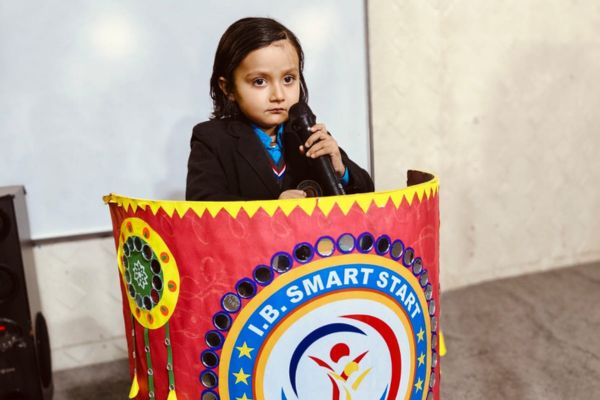
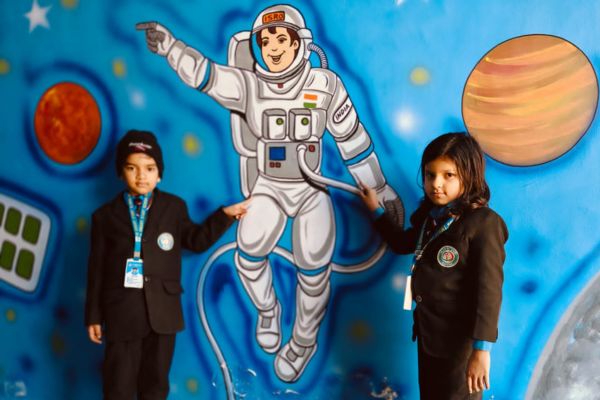
The IBSS classrooms are ‘Print-Rich’ with display materials such as charts and posters that expose students to written language in different contexts. The Language Programme uses teaching aids such as Sandpaper Letters, the Small and Large Movable Alphabet, the Phonetic Farm and many more to facilitate the development of key literacy and phonic skills, encapsulated in the four language skills: Listening, Speaking, Reading and Writing (LSRW).
Engaging Them Through the Sensory Route:
It is through the senses that children get familiar with their environment. By working with materials such as cylinder blocks, thermic tablets and red rods, students learn to classify the objects they see around them. This classification enables them to take the first steps towards developing their sensory intelligence, which, in turn, allows them to better adapt to their environment.
Imagination Through Drama:
At Smart Start, we believe that drama is a powerful tool that taps into children's innate abilities to imagine, communicate and empathise. The school’s drama programme provides the young learners with a creative platform to emote and express even their understated emotions and thoughts through theatrics.
We want our children to start enjoying the richness of storytelling by introducing them to diverse mediums such as mime, puppetry, mono acting and other forms of theatre and stage craft. This exposure allows them to broaden their understanding of the myriad shades of human behaviour which would prepare them for effective communication through correct enunciation and modulation as they grow up.
The school activity calendar is planned in such a way that each week there is a different theme-based activity for the young learners that ignites their imagination, expands their vocabulary and fosters creativity. Drama, is not limited to acting; these learning experiences contribute significantly to the children's social-emotional development. As they explore their emotions and learn to interpret others' feelings, they cultivate empathy and emotional agility, essential in today’s strife-ridden times.
Learning Through Music:
Music is an integral part of the Foundational Stage curriculum in IBSS, as Music and dance come naturally to children. Teaching music to early learners can be a fun and rewarding experience.
IBSS employs some effective strategies to enable its young learners to develop an immense liking for this universal medium of expression, some of them are as follows:
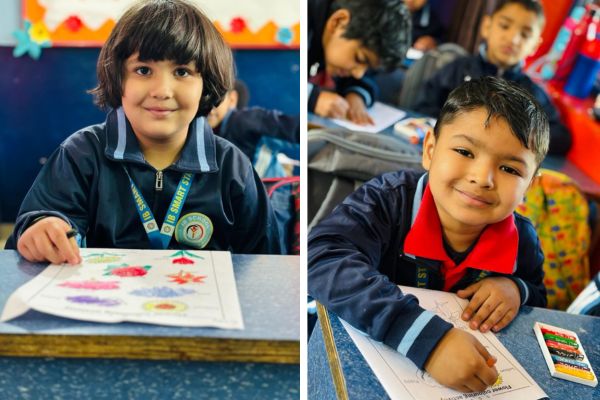

Creating a Musical Environment:
The young learners are immersed in a music-rich environment through a set-up of musical instruments such as drums, xylophones, tambourines, shakers, and simple keyboard instruments and also display charts of musical symbols, notes. This familiarises them with the basic music concepts in a very informal manner.
A typical day at school is interspersed with singing nursery rhymes, children's songs and simple melodies that are easy for young children to sing along. Plenty of reinforcement is done by repeating the same compositions till the children can sing them with confidence.
Exploring Rhythms and Beats:
Young learners are encouraged to explore rhythms and beats as we introduce them to basic rhythmic patterns through clapping, tapping, and stomping exercises along with rhythm sticks, tambourines or hand drums to practise different beats and patterns. Music is played at varying tempos (fast, slow) and children encouraged to move or dance in response to the music.
Learning Through Movement:
Movement and dance are combined with the music lessons where children learn simple movements or gestures that correspond to songs or musical phrases.
Improvisation and Creativity:
The little students are made to improvise and create their own musical ideas without any fear of ridicule. They create their own musical sounds, rhythms and melodies using instruments or just their voices. A supportive environment is fostered wherein children are free to be themselves in the world of music.
Exploring Different World Cultures and Music Styles:
Young students of IBSS are introduced to music from diverse cultures and genres: a rich tapestry of folk songs of different world cultures, classical pieces, seasonal, and contemporary children's music that exposes them to a variety of musical styles and traditions. This facilitates a greater awareness of different cultures that fosters global citizenship.
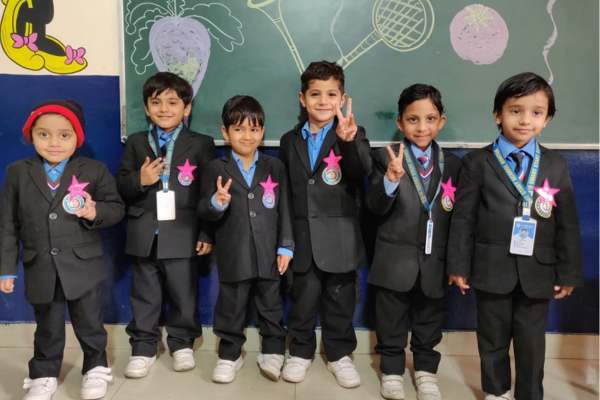
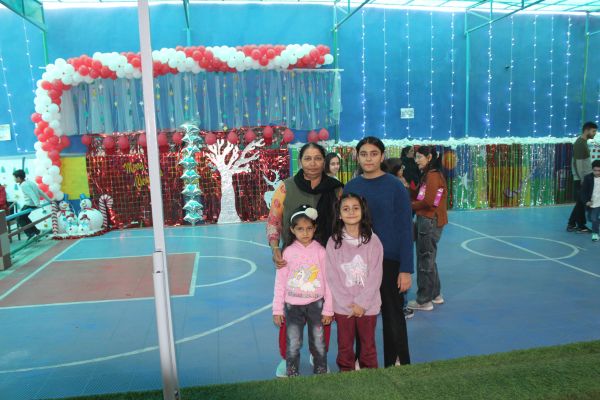
Engaging Parents and Families in the Musical Journey:
Since parents are invaluable partners in our educational plan, they also support us by inculcating this love for music in their young wards. Lyrics of the songs, rhymes and other music resources are shared with them so that children get the same musical environment at home.
The Music Programme at Smart Start is not just about learning to play an instrument or sing a song; it's about understanding the language of music and its emotional depth, enhancing their cognitive skills, and cultivating a lifelong love and appreciation for music.
In essence, IB School stands out for its commitment to providing a challenging yet nurturing environment, personalized learning approach, rigorous curriculum, and preparation for future opportunities in Artificial Intelligence, Robotics, and beyond. The school empowers students to become well-rounded individuals with a strong academic foundation and a readiness to embrace the advancements of the future.

- ACF pro plugin
- Looking to boost your WordPress site’s SEO? With the Yoast SEO Premium plugin Download, you can access the latest version of the most advanced SEO plugin for WordPress. This release is perfect for developers, testers, and anyone learning how to use professional SEO tools effectively.
- WP Rocket is a top-rated caching plugin for WordPress that boosts your website’s speed and performance effortlessly. To improve loading times and optimize your site, grab the free download and start accelerating your WordPress today.
- Polylang Pro is a powerful WordPress plugin that lets you easily create multilingual websites with full control over translations. If you want to enhance your site’s language capabilities, try the Polylang to get started.
-
Ved Bhawan Sector - 2,3 Behind Telephone Exchange of Sector 1 Rohtak , (Haryana)
-
-
Copyright 2022 © IB School Rohtak